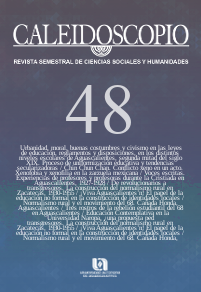A Researcher at School: Reflections on Positioning through an Autoethnographic Account
DOI:
https://doi.org/10.33064/48crscsh4342Keywords:
autoethnography, positioning, educative research, ethicsAbstract
In this article I present a reflective analysis of my experience conducting fieldwork in a public elementary school in Mexico. Based on the concept of positioning (Hemelsoet, 2014), I observe the interaction of my role as a researcher with other roles in my life (postgraduate student, training teacher), using it as a particular position from which it is possible to create knowledge. I also analyze how the interaction between these roles was modified throughout the investigation thanks to the actions taken to face unforeseen situations and conflicts that took place in the field. By evoking encounters with both teachers and students through an autoethnographic narrative, I incorporate the experience of the researcher in the study of others (Ellis, Adams, & Bochner, 2010) and discuss the criteria of objectivity and distance in social research.
Downloads
References
Ballestín, B. (2009). La observación participante en primaria: ¿un juego de niños? Dificultades y oportunidades de acceso a los mundos infantiles. AIBR. Revista de Antropología Iberoamericana, 4(2), 229–244. https://dialnet.unirioja.es/descarga/articulo/3039014.pdf
Berger, P. y Luckmann, T. (2012). La construcción social de la realidad. Amorrortu Editores.
Díaz, E. (2018). Niñez en instituciones de cuidado alternativo: narrativas escolares [Tesis de maestría]. Universidad Autónoma de Aguascalientes. http://bdigital.dgse.uaa.mx:8080/xmlui/handle/11317/1593
Ellis, C. (2007). Telling secrets, revealing lives. Qualitative Inquiry, 13(1), 3–29. https://doi.org/10.1177/107780040629494
Ellis, C. (2009). Telling tales on neighbors: ethics in two voices. International Review of Qualitative Research, 2(1), 3–27. http://www.jstor.org/stable/10.1525/irqr.2009.2.1.3
Ellis, C., Adams, T. y Bochner, A. (2010). Autoethnography: an overview. Forum: Qualitative Sozialforschung / Forum: Qualitative Social Research, 12(1). https://doi.org/10.17169/fqs-12.1.1589
Fine, G. y Sandstrom, K. (1988). Knowing children. Participant observation with minors. Sage.
Griffin, K., Lahman, M. y Opitz, M. (2016). Shoulder-to-shoulder research with children: Methodological and ethical considerations. Journal of Early Childhood Education, 14(1), 18–27. https://doi.org/10.1177/1476718X14523747
Hemelsoet, E. (2014). Positioning the educational researcher through reflections on an autoethnographical account: on the edge of scientific research, political action and personal engagement. Ethics and Education, 9(2), 220–233. https://doi.org/10.1080/17449642.2014.925033
Liebel, M. (2007). Paternalismo, participación y protagonismo infantil. En Y. Corona y M.E. Linares (Eds.), Participación infantil y juvenil en América Latina (pp. 113–146). Universidad Autónoma Metropolitana. https://programainfancia.uam.mx/peternalismo-participaci%C3%B3n-y-protagonismo-infantil
Liebel, M. y Markowska-Manista, U. (2020). Presentación. Cuestiones éticas y epistemológicas en la investigación con niños. Sociedad e infancias, 5, 1–4. https://doi.org/10.5209/soci.74230
Mayall, B. (2000). The sociology of childhood in relation to children’s rights. The International Journal of Children’s Rights, 8(3), 243–259. https://doi.org/10.1163/15718180020494640
Molloy, C. (2015). Getting by or getting in? Grappling with access and affect in qualitative research projects involving vulnerable human subjects. Qualitative Inquiry, 21(5), 467–476. https://doi.org/10.1177/1077800415569783
Pavez Soto, I. (2012). Sociología de la infancia: las niñas y niños como actores sociales. Revista de Sociología, (27), 81–102. https://doi.org/10.5354/0719-529X.2012.27479
Pierson, R. (2013, mayo). Todo niño necesita un campeón [video]. Conferencia TED. https://www.ted.com/talks/rita_pierson_every_kid_needs_a_champion?language=es
Downloads
Published
How to Cite
Issue
Section
License

This work is licensed under a Creative Commons Attribution-NonCommercial-ShareAlike 4.0 International License.
Licencia Creative Commons Atribución-NoComercial-CompartirIgual 4.0 Internacional
El lector es libre de compartir o adaptar el material en cualquier medio o formato bajo las condiciones siguientes: (a) debe reconocer adecuadamente la autoría, proporcionar un enlace a la licencia e indicar si se han realizado cambios; (b) no puede utilizar el material para una finalidad comercial y (c) si remezcla, transforma o crea a partir del material, deberá difundir sus contribuciones bajo la misma licencia que el original.
Resumen de la licencia
https://creativecommons.org/licenses/by-nc-sa/4.0/deed.es_ES
Texto completo de la licencia
https://creativecommons.org/licenses/by-nc-sa/4.0/legalcode
Cada autor es responsable del contenido de su artículo. En el caso de un texto colectivo, el primer autor asume la responsabilidad intelectual de los resultados del proceso editorial; los autores son responsables de obtener la licencia de autor para reproducir materiales gráficos o fotográficos que pertenecen a terceros.
Los autores asumen plena responsabilidad en el caso de falsificación de datos o falta de autenticidad en la investigación. Se comprometen, también, a no reutilizar trabajos ya publicados, total o parcialmente, para presentarlos en otra publicación.
Estas condiciones aplican tanto a la versión impresa como a la versión electrónica de la revista.


















